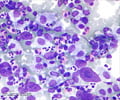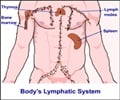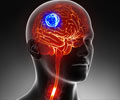- MacDiarmid J.A. et al. (2007)
- "Bacterially Derived 400 nm Particles for Encapsulation and Cancer Cell Targeting of Chemotherapeutics" Cancer Cell 11, 431-445, May 2007
About Chemotherapy Drugs
Chemotherapy drugs are medications that perform like 'magic bullets' to destroy cancer cells in the body.
These drugs are used in over half the patients who are treated for cancer, and are administered, either to cure the disease or given as a part of palliative care.
It has been deduced that the chemotherapy drugs act on the fast–dividing cells by arresting the mitotic stages of cell cycle. Hence they are also called 'cytotoxic' drugs. These drugs are used to treat not only the dividing cancer cells in an organ but also to treat distant sites, within an individual's body, to which the tumor or cancer may have spread. Hence chemotherapy is a systemic therapy, meaning, it treats the whole body for cancer. The treatment often includes supportive medications to minimize the side effects of the drugs.
Chemotherapy drugs have a better impact on tumors that have a considerable population of differentiated cells, in other words, tumors that are 'young'. Some drugs bring about a semblance of orderliness in tumor cells by promoting 'apoptosis' or 'programmed cell death'-a function which is lost when the normal cells turn malignant.
During the World War II mustard gas, used as a warfare agent, was accidentally discovered to induce low WBC counts. This agent was consequently used to treat individuals with late-stage lymphomas with dramatic early results. When it was first put into practice there were many side effects, some of which was fatal. Now the practice is much safer, thanks to the use of combination protocols and better monitoring. Targeted treatments are being developed to make cancer treatments more effective.












